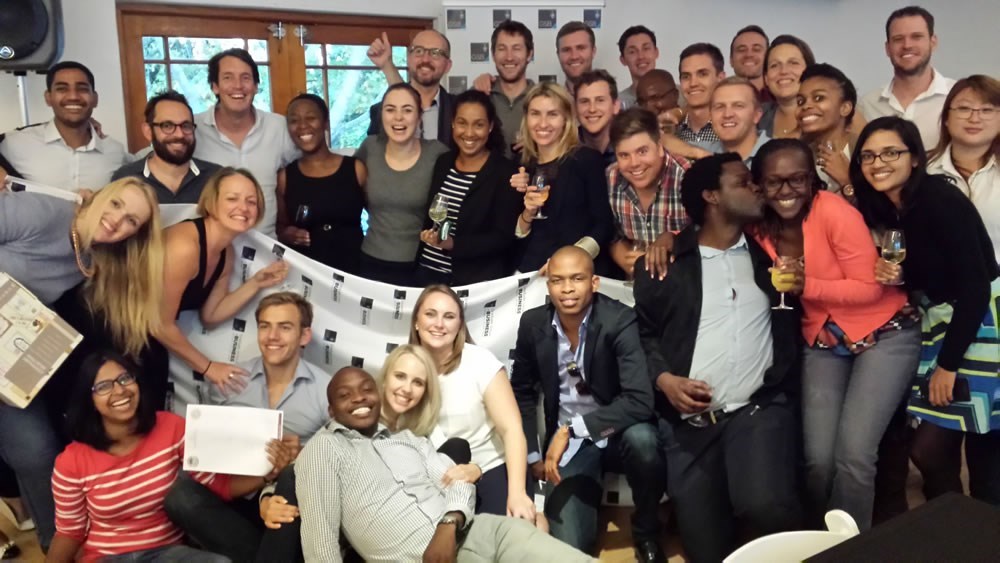Sunday lunchers are treated to lambs roasting on the spit and scarcely a week goes by without some public or private function bringing a horde of visitors to this wine farm that has been the home of three generations of the Back family.
It did thus not come as a surprise when in 2009 Simon Back, member of aforementioned third generation and currently the Backsberg CEO, introduced the first Vino Varsity wine competition where UCT and Stellenbosch were invited to pit their wine knowledge and tasting skills against one another. The event proved to be a huge success, providing students the opportunity of deploying the knowledge they had picked up in their wine farm visits and organised tastings, giving Simon and his team an insight into the image and perception of wine among the younger market and, of course, to have a bit of fun as well.
Vino Varsity grew in stature with Wits sending its wine society to the Cape to participate and the event finding itself the only one of its kind on the industry wine calendar.
I attended these Vino Varsities from day one, and from the outset the event provided me as a wine industry professional with valuable insight into the enthusiasm and impassioned interest wine lovers between the ages of 19 and 25 were showing in various wine-related aspects. Cheered on by their peers, the teams showed their stuff in answering questions on wine general knowledge, as well as putting in some impressive performances in the blind-tasting section.
Last year Simon decided to take the Vino Varsity concept one step further by inviting the MBA students from the UCT and Stellenbosch business schools to participate, the aim being to get a more focussed and cerebral grouping of students involved who may or may not actually have any wine experience or interest.
Having attended the second Business School Vino Varsity this year, it is apparent that besides the carousing, the cheering and the student vibe only the youth can create, there are some very important industry insights to tap into from the graduates participating in the event. The UCT and Stellenbosch MBA students already have degrees and in most cases their sights are set on a career path. The expected irreverence in attending a day out on a wine estate is obviously there, but the kids’ ambition is tangible, enthusiasm oozes from them and the competitive edge between the universities bring a senior, mature element to the Vino Varsity concept.
As I said to Rico Basson, CEO of producer organisation Vinpro after the event, having these students present their take on the wine industry at Vinpro’s annual information day would not be without interest.
Simon’s format for this year’s Business School Vino Varsity involved a debate between the two teams on their prediction as to what Wine South Africa would look like in 30 years’ time. This was to be followed by a branding and marketing exercise where each university had to develop a wine using a few white and red blending components, give the wines a name, conceptualise the packaging and come up with marketing strategy in one hour.
A tough call, but then again these are MBA students, and the second element of the competition saw each university’s entire class partake after dividing themselves into various groupings for some impressive future mid-managerial delegation to take place.
In the debate section, UCT and Stellenbosch could not have been more different in their approach.
UCT took a formal boardroom presentation angle. All business-like, the current challenges faced by the South African wine industry were pointed out with each point given formal and insightful airtime as to remedial measures needed to grow it when 2046 rolls around.
Stellenbosch, on the other hand, had a more laid-back and offbeat approach using emotion and a bit of theatre to prove how the road ahead could be paved with gold.
Despite the difference in approach, both UCT and Stellenbosch were spot-on in identifying the challenges facing wine South Africa.
• Low local consumption of wine compared to other drinks sectors
• Insufficient attention to new and younger markets
• A need to address black consumers
• Taking a broader and more confident approach to communicating Brand South Africa to the world
• Dropping the regional myopic approach and focussing more on Gauteng and other parts of South Africa
• Using new media and technology – not one of the teams even bothered to mention print, radio or television
• Placing greater emphasis on new wine styles instead of relying on the old tried and tested ones the industry deems relevant
• Creating brands that are not shy to be big and of a high profile, but that have stories that resonate with consumers
• Transformation is non-negotiable if a wider audience for the category is sought.
When it came around to creating their own wine brands, there were thus no real surprises when both UCT and Stellenbosch took a hot, hip and happening tack in concocting labels oozing sex appeal, glamour, modern appeal and fashion. Not a Dutch Gable, mountain-hugging vineyard or family crest in sight.
And in marketing the product, the voice is loud, in-your-face, confident and young, and the approach is to appeal directly to the consumer through Instagram, eventing, facebook and twitter. And the big part of this appeal is creating a conversation, talking to be heard and talking again if not being heard yet.
Oh, and the UCT Graduate School of Business won. But the real winner was the overall enthusiasm and confidence with which the wine industry’s status quo was addressed by tomorrow’s business leaders. If some of them make it into the industry, the future is bright enough to call for shades.
